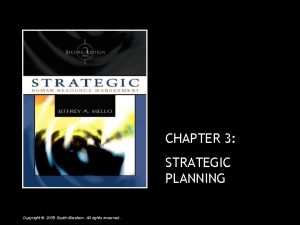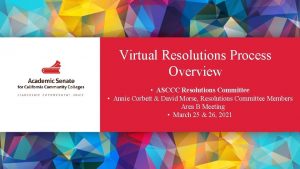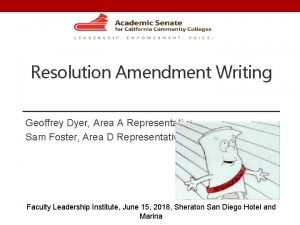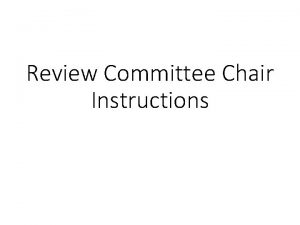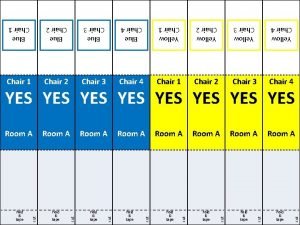Resolutions SOS Geoffrey Dyer Resolutions Committee Chair Eric












- Slides: 12

Resolutions SOS Geoffrey Dyer, Resolutions Committee Chair Eric Narveson, Evergreen Valley College

Resolutions & Amendments Due at 4: 45! • Session will quickly review guidelines for resolutions & amendments and provide handson assistance from presenters

Resolutions & Amendments Due at 4: 45! • Submit electronically to resolutions@asccc. org • Signatures of four registered delegates required on submission form • Resolution full text /Amendment (recopied with strikeouts and new text underlined) with title! Do not use “track changes”. • Include contact information (Cell phone preferred)

Most Important Things to Ask • Are intent and all parts of resolution clear? • Does the proposed resolution duplicate or reverse an existing resolution? • Is the action within the purview of the ASCCC?

Resolution Writing and General Advice • Four is the Limit: Resolutions cannot contain more than four “whereas” or “resolved” statements (this is a requirement per the published resolutions process for session). • Homework: The Academic Senate has hundreds of resolutions, and they are accessible for review on its web site, www. asccc. org. It is possible that a resolution already exists for the position you wish to take. Please review the existing resolutions first so that duplication can be avoided. • An Introduction: Consider using the first “whereas” as an introduction, outlining the situation in general or providing background and indicating the people or groups involved before justifying your resolutions in the other “whereas” statements.

Resolution Writing and General Advice • Acronyms: Write out the names of groups or organizations in your first reference to them in your resolution. The full name may be followed by a parenthetical abbreviation, which may then be used for future references. It is unnecessary to note an acronym if the group or organizations is not referenced again in the resolution. • Make the Point: Be as direct and to the point as possible. Cleverness that makes a resolution less clear will likely cause confusion and lead to the resolution being defeated, amended, or referred. • Avoid Lumping: Limit yourself to one reason in support of or in defense of your resolution per “whereas” statement. Lumping too much into one statement causes confusion and is likely to provoke calls for revision.

Resolution Writing and General Advice • Professionalism Preferred: Avoid personal attacks or insults of any person or group, even subtle ones. No matter how justified the statement or how offensive the target, such attacks will almost inevitably draw opposition from some members of the voting body. • Only Academic Senate Action: Remember that resolutions can only direct the Academic Senate to take action. The Academic Senate does not have the authority to direct or require action from any other group or individual, including local senates. Resolutions can also request or recommend actions from other entities, or it can endorse or support particular positions of other entities. • Reality Check: If your resolution directs an action by the Academic Senate, be certain that the action is possible for the Academic Senate to accomplish. Specifically, remember that the Academic Senate cannot absolutely ensure or prevent the actions of any other body. Some qualifying or alternative terms, such as “work with [other body] to ensure” rather than “ensure, ” or “oppose” rather than “prevent, ” may help to produce a more realistic resolution.

Resolution Writing and General Advice • Word Choice: Judiciously use words such as “any, ” “every, ” “all, ” “never, ” “none, ” or other qualifiers that make sweeping generalizations. • Models: You may benefit from reading some past examples of resolutions for ideas about structuring and phrasing your resolution. • Resolution Title: Be sure that the title of the resolution accurately reflects the content of the resolution, and follows proper rules of punctuation and capitalization.

Resolution Writing and General Advice • Citing Legislation: In the body of the resolution, cite the last name of the bill’s author and the year passed or the date of the most recent version of the proposed stated legislation or regulations included in the resolution. In the title of the resolution, indicate the position on the bill and the topic of the bill. Place the author’s last name followed by a comma and the year or date in parentheses behind the title or number of the legislation and include a hyperlink to the language in the legislation in a footnote. For example, AB 1602 (2016, Committee on Budget); AB 620 (Block, 2011); AB 705 (Irwin, as of April 4, 2017). • Facts: Resolutions should focus on facts rather than empty rhetoric. Resolutions should include references to specific information such as legislation, previous resolutions, papers, and the like, and should include footnotes, appendices, or links to those references for the delegates to research and make an informed vote

Resolution Writing and General Advice • Senate Papers: All of the Academic Senate adopted papers contain recommendations to local senates as well as to the state senate. These recommendations are considered to be directions to the field and are comparable to resolutions. Review the recommendations in Senate papers related to your topic to see if your issue has already been addressed.

Only Academic Senate Action • The Resolveds should all begin in this way: • Resolved, That the Academic Senate for California Community Colleges _____

Verbs that Work • Urge • Conclude • Research • Adopt • Develop (a position, • Request materials, a paper, etc. ) • Distribute • Oppose • Publish • Survey • Encourage • Express • Form • Collect • Communicate • Recognize
